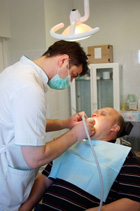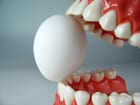 Periodontal disease, also known as gingivitis or gum disease, describes the condition that begins with bacterial growth and plaque build up in the mouth that can lead to tissue destruction and ultimately lost teeth.
Periodontal disease, also known as gingivitis or gum disease, describes the condition that begins with bacterial growth and plaque build up in the mouth that can lead to tissue destruction and ultimately lost teeth.
In the first stages of the disease (most commonly called gingivitis for less serious cases) plaque and bacteria build up around the gums causing inflammation and possibly bleeding. This irritation of the gums also may cause them to be sore. It can be treated with improved cleaning or by a dentist. If left untreated however, it will continue to progress causing further health problems for your gums. It can cause gaps to develop between the teeth and gums which in turn become infected allowing the disease to spread.
Periodontal disease can be caused by a number of factors. Hormonal changes or illness may the cause an imbalance of bacteria and make the gums more sensitive. This can also be caused by taking some medications and lifestyle choices such as smoking. The most common cause of gum disease by far, however, is poor oral hygiene. Inadequate brushing and flossing means not enough plaque is removed from the teeth or gums and the disease is allowed to take hold.
If you suspect you may be suffering from periodontal disease, it is important that you make an appointment to see a Central Leeds as soon as possible. If the condition is mild it may be easily treatable, but serious cases may require antibiotics or possibly even surgical treatment. This is because of the serious nature of advanced periodontal disease and the possible links to heart disease and further health complications.





 It is a fact that people with diabetes are more likely to be suffering from periodontal disease, also known as gum disease, as people who do not have the condition. This is mainly because diabetes affects the immune system making sufferers more likely to catch infections. Periodontal disease is widely considered to be the sixth complication of diabetes by healthcare professionals.
It is a fact that people with diabetes are more likely to be suffering from periodontal disease, also known as gum disease, as people who do not have the condition. This is mainly because diabetes affects the immune system making sufferers more likely to catch infections. Periodontal disease is widely considered to be the sixth complication of diabetes by healthcare professionals. Periodontal disease, often commonly referred to as gum disease, is seen in two degrees of severity. Milder gum disease is called gingivitis and involves a mild inflammation of the gum tissue. It is estimated that three quarters of all adults in the UK will experience some gingivitis at some point. It is usually easily remedied by improved oral hygiene and some treatment from a dentist. The other more serious form of gum disease is called periodontitis and requires much more substantial treatment. It usually stems from a failure to address or treat the milder form of the disease and can cause significant dental problems such as infections and tooth loss. In fact, periodontitis is responsible for more tooth loss in the UK than tooth decay.
Periodontal disease, often commonly referred to as gum disease, is seen in two degrees of severity. Milder gum disease is called gingivitis and involves a mild inflammation of the gum tissue. It is estimated that three quarters of all adults in the UK will experience some gingivitis at some point. It is usually easily remedied by improved oral hygiene and some treatment from a dentist. The other more serious form of gum disease is called periodontitis and requires much more substantial treatment. It usually stems from a failure to address or treat the milder form of the disease and can cause significant dental problems such as infections and tooth loss. In fact, periodontitis is responsible for more tooth loss in the UK than tooth decay. There are over 350 types of bacteria found in the average human mouth but many of these have no real harmful effects. However, about 5 per cent of these bacteria are responsible for causing gum disease if not removed by brushing and flossing.
There are over 350 types of bacteria found in the average human mouth but many of these have no real harmful effects. However, about 5 per cent of these bacteria are responsible for causing gum disease if not removed by brushing and flossing. Gum disease is the infection of the gingival tissue that surrounds and supports teeth and occurs in two stages called gingivitis and periodontitis.
Gum disease is the infection of the gingival tissue that surrounds and supports teeth and occurs in two stages called gingivitis and periodontitis. The stigma that has been attached to wearing dentures over the years is gradually disappearing. As they become better manufactured and more lifelike, many denture wearers now go through life without anybody ever knowing they are wearing them.
The stigma that has been attached to wearing dentures over the years is gradually disappearing. As they become better manufactured and more lifelike, many denture wearers now go through life without anybody ever knowing they are wearing them. Dentures are a dental solution for patients who have no remaining teeth, or patients who have several teeth missing, when a partial denture may be used. There are a number of reasons why patients may have lost their teeth. It may be the result of periodontal disease, tooth decay or even some kind of trauma to the head. When some, or all teeth, are missing it is very important to replace them as it can result in a sagging facial appearance which can make you appear older because teeth act as rigid supports for facial muscles.
Dentures are a dental solution for patients who have no remaining teeth, or patients who have several teeth missing, when a partial denture may be used. There are a number of reasons why patients may have lost their teeth. It may be the result of periodontal disease, tooth decay or even some kind of trauma to the head. When some, or all teeth, are missing it is very important to replace them as it can result in a sagging facial appearance which can make you appear older because teeth act as rigid supports for facial muscles.

